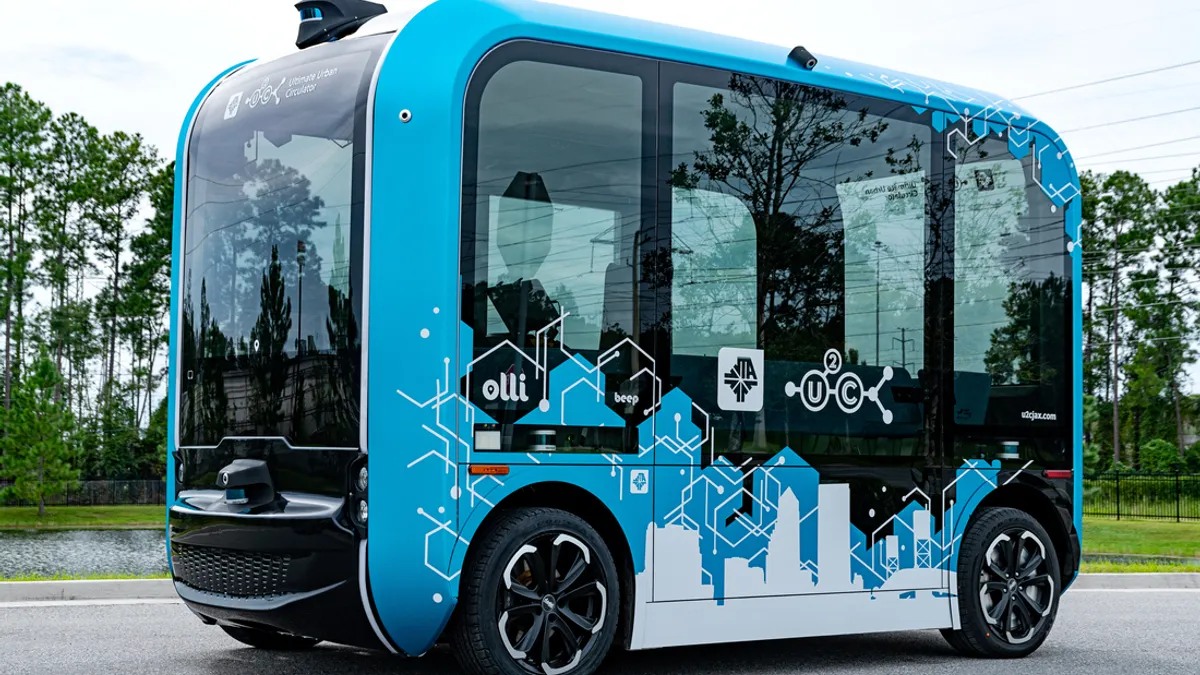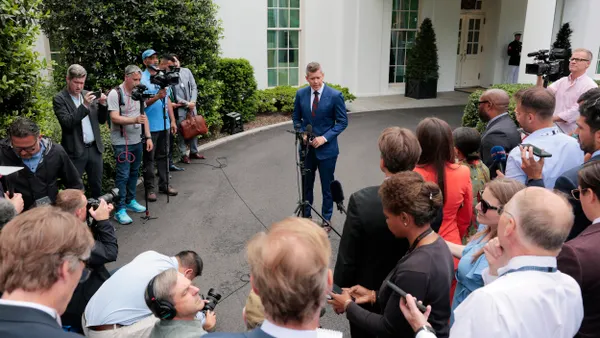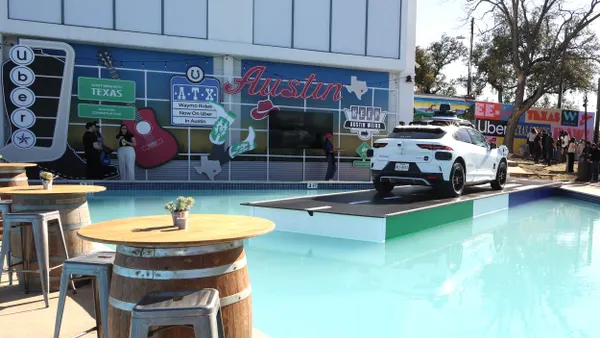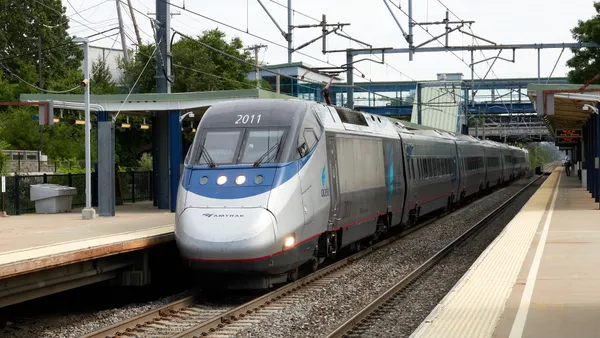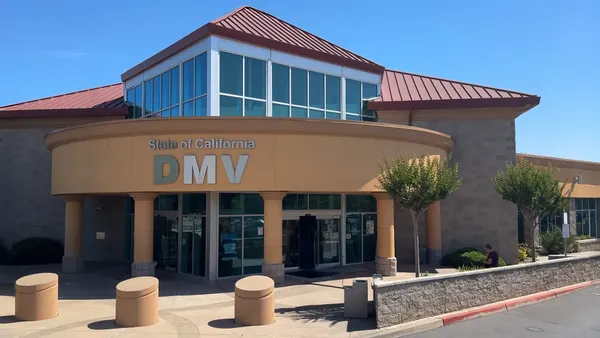UPDATED, Sept. 16, 2020: Autonomous vehicle (AV) startup Beep unveiled on Tuesday its first 3D-printed Olli 2.0 shuttle, developed by Local Motors and autonomous tech company Robotic Research. The shuttle was delivered to the Jacksonville Transportation Authority (JTA) to complement its Test & Learn program.
JTA will utilize the Olli 2.0 vehicle in advancing its Ultimate Urban Circulator (U2C) initiative, which intends to modernize the city's existing Skyway transit system. This vehicle is the fifth AV that JTA has tested since the launch of U2C in 2017.
"The delivery of the Olli 2.0 at our Test & Learn track marks the next step in shaping the future of public transportation– not just in Jacksonville, but nationally," said JTA CEO Nathaniel Ford.
Dive Brief:
- Local Motors and Florida-based autonomous vehicle (AV) startup Beep announced today a strategic partnership and new reseller agreement that will enable the companies to more broadly deploy autonomous shuttles to the public.
- Local Motors, which dubs itself the world's "first and only digital vehicle manufacturer," will provide Beep with its autonomous, electric, 3D-printed Olli 2.0 shuttles for future deployments. Beep in turn will offer expertise gained through AV interactions and testing with mixed traffic, pedestrians and other traffic hurdles to help Local Motors "advance their platforms and capabilities," Beep CEO Joe Moye told Smart Cities Dive in an interview.
- The partnership is driven in part by the companies' involvement in the National Highway Traffic Safety Administration (NHTSA)'s AV TEST Initiative, launched in June. Beep and LM's agreement aims to further bolster voluntary data sharing across the AV industry.
Dive Insight:
Moye and Local Motors CEO John Rogers both expressed excitement around the partnership in separate interviews with Smart Cities Dive. While Moye said Local Motors' "years of development efforts" will be a significant benefit to newcomer Beep's operations, Rogers echoed a sense of admiration for Beep's "switched-on" approach to AV development.
"It doesn’t matter if they’re young in this game or have been around for a while," Rogers said. "Being an operator that’s long in the tooth, I don’t think helps you at all when it comes to autonomy."
Over the last 18 months, Beep has solidified its footprint in Florida through autonomous shuttle partnerships with a number of transit agencies and private development groups. Beep also pursued a goods-moving pilot enabling its vehicles to transfer COVID-19 tests from a testing site in Jacksonville, FL to the local Mayo Clinic. Outside of Florida, Beep runs an autonomous shuttle service in Peoria, AZ.
Moye said he hopes the partnership with Local Motors will help Beep expand its presence in Arizona and into Tennessee, and leverage opportunities for federal projects — an area Moye said Local Motors is successful in.
Local Motors currently operates its Olli shuttles in GoMentum Station, CA and National Harbor, MD, among a number of international locations. The newest iteration of the shuttles, Olli 2.0, are 3D-printed, allowing Local Motors to cut costs on tools and molds that manufacturers traditionally use to build autonomous shuttles.
"What I found early on is that it’s the tooling intensity, the costs of fixtures and molds, that keep vehicles from evolving quickly. We think vehicles are made the wrong way. And we think, especially for AVs that are coming out, we’re going to need adoption at the rate like Apple has with cellphones," Rogers said. "The development times of four years, like Tesla, is slow. Way too slow."
Beep's exploration of using AVs to move goods is an effort Local Motors also wishes to pursue, which is "something that’s very attractive to us as an extension of this partnership and opening up some new market opportunities," Moye said.
The companies also align on data and information-sharing, as two of the first participants in the AV TEST initiative.
"Sharing has been in our DNA from the beginning," as partners are key for successful development of emerging technologies, Rogers said.
Both CEOs lauded NHTSA's efforts to increase industry transparency, but said more must be done to cut through the red tape of regulations and lawmaking.
"There’s work that has to be done on the regulatory side and the legislative side to make things easier, but we also can’t lose sight of needing to do this in a safe fashion," Moye said. "We can’t afford accidents and incidents at any level because we all fail.”
Rogers said he doesn't believe regulators stand in the way, "but I'm not going to give our federal government a pass when it comes to getting AVs on the road." Legislators are notoriously slow at "making laws that challenge and allow new technology to happen," and must create laws that allow current AVs — particularly those that do not yet have a classification — to operate on roads, he said.
When Nuro received NHTSA's first temporary AV exemption from certain federal requirements in February, critics said the exemption was "irresponsible" and did not prioritize safety. When asked his reaction to this pushback, Rogers said, "Shame on them."
"Why is it responsible for us to sit like a frog in boiling water and to say it’s okay to run current vehicles, texting and driving, and not ever try to put AVs in good situations — appropriate situations — so that we can learn and work with them and improve that record of safety?" Rogers said. "Nothing ventured, nothing gained."



